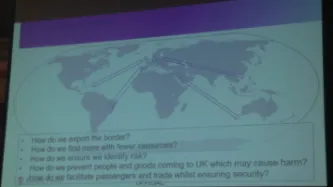Search
Content type: Advocacy
Privacy International welcomes the UK House of Lord’s Justice and Home Affairs Committee’s investigation and subsequent report on electronic monitoring.The UK currently monitors some individuals who have interacted with the criminal justice system, and all individuals released on bail from immigration detention, through fitted GPS tags and non-fitted monitoring devices.In the immigration context, the Home Office touts electronic monitoring as a less restrictive way to maintain contact with…
Content type: Long Read
On the basis of a year of legal research by PI as well as documents obtained by other civil society organisations, and evidence provided by legal representatives fighting these automated systems on behalf of their clients, on the 18th August 2025, we issued a formal complaint to the UK Information Commissioner (ICO) regarding the UK Home Office’s use of two ‘automated recommendation-making tools’ (ARMTs), the Identify and Prioritise Immigration Cases tool (IPIC) and the Electronic Monitoring…
Content type: Long Read
Social media is now undeniably a significant part of many of our lives, in the UK and around the world. We use it to connect with others and share information in public and private ways. Governments and companies have, of course, taken note and built fortunes or extended their power by exploiting the digital information we generate. But should the power to use the information we share online be unlimited, especially for governments who increasingly use that information to make material…
Content type: Advocacy
BackgroundThe Snowden revelations and subsequent litigation have repeatedly identified unlawful state surveillance by UK agencies. In response, the UK Parliament passed the highly controversial Investigatory Powers Act 2016 (IPA), which authorised massive, suspicionless surveillance on a scale never seen before, with insufficient safeguards or independent oversight.Privacy International led legal challenges to this mass surveillance regime both before and after the Act became law. The Act…
Content type: Long Read
In the UK, successive government ministers and members of parliament have made emotive proclamations about the malaise of "public sector fraud".
This year, former Work and Pensions Secretary Therese Coffey said that the welfare system "is not a cash machine for callous criminals and it’s vital that the government ensures money is well spent...[and] fraud is an ever-present threat."
In 2013, the UK's minister for the disabled made numerous claims that there were "vast numbers of bogus disabled […
Content type: Report
Privacy International’s submissions for the Independent Chief Inspector of Borders and Immigration inspection of the Home Office Satellite Tracking Service Programme
The Home Office have introduced 24/7 electronic monitoring and collection of the location data of migrants via GPS ankle tags. This seismic change cannot be overstated. The use of GPS tags and intention to use location data, kept for six years after the tag is removed, in immigration decision-making goes far beyond the mere…
Content type: Press release
Today, the High Court ruled that the Home Secretary acted unlawfully and breached human rights and data protection laws by operating a secret, blanket policy of seizing, retaining and extracting data from the mobile phones of asylum seekers arriving by small boat.
This claim for judicial review was brought by three asylum seeking claimants: HM represented by Gold Jennings, and KA and MH represented by Deighton Pierce Glynn. The Claimants, like thousands of others arriving by small boat, all…
Content type: News & Analysis
Around the world, we see migration authorities use technology to analyse the devices of asylum seekers. The UK via the Policing Bill includes immigration officers amongst those who can exercise powers to extract information from electronic devices. There are two overarching reasons why this is problematic:
The sole provision in the Policing Bill to extract information rests on voluntary provision and agreement, which fails to account for the power imbalance between individual and state. This…
Content type: News & Analysis
It is difficult to imagine a more intrusive invasion of privacy than the search of a personal or home computer ... when connected to the internet, computers serve as portals to an almost infinite amount of information that is shared between different users and is stored almost anywhere in the world.
R v Vu 2013 SCC 60, [2013] 3 SCR 657 at [40] and [41].
The controversial Police Crime Sentencing and Courts Bill includes provision for extracting data from electronic devices.
The Bill…
Content type: Report
It is common for families with no recourse to public funds who attempt to access support from local authorities to have their social media monitored as part of a 'Child in Need' assessment. This practice appears to be part of a proactive strategy on the part of local authorities to discredit vulnerable families in order to refuse support. In our experience, information on social media accounts is often wildly misinterpreted by local authorities who make serious and unfounded allegations…
Content type: Case Study
Every one of us has an expectation to be legally protected in the same way, to have access to the same human rights, and to be able to defend those rights in court.
However, for trans and non-binary people, this has not always been the case – and in many places around the world it still isn’t the case. The lack of legal recognition for their gender has had significant consequences.
If the law does not recognise you as the person that you are and treats you as someone you are not then you…
Content type: News & Analysis
Today Advocate General (AG) Campos Sánchez-Bordona of the Court of Justice of the European Union (CJEU), issued his opinions (C-623/17, C-511/18 and C-512/18 and C-520/18) on how he believes the Court should rule on vital questions relating to the conditions under which security and intelligence agencies in the UK, France and Belgium could have access to communications data retained by telecommunications providers.
The AG addressed two major questions:
(1) When states seek to impose…
Content type: News & Analysis
*Photo by Michelle Ding on Unsplash
Pat Finucane was killed in Belfast in 1989. As he and his family ate Sunday dinner, loyalist paramilitaries broke in and shot Pat, a high profile solicitor, in front of his wife and children.
The Report of the Patrick Finucane Review in 2012 expressed “significant doubt as to whether Patrick Finucane would have been murdered by the UDA [Ulster Defence Association] had it not been for the different strands of involvement by the…
Content type: Long Read
*Photo by Kristina Flour on Unsplash
The British government needs to provide assurances that MI5’s secret policy does not authorise people to commit serious human rights violations or cover up of such crimes
Privacy International, along Reprieve, the Committee on the Administration of Justice, and the Pat Finucane Centre, is challenging the secret policy of MI5 to authorise or enable its so called “agents” (not MI5 officials) to commit crimes here in the UK.
So far we have discovered…
Content type: News & Analysis
Privacy International has joined over 30 organisations working with migrants and refugees to write to the newly appointed British Home Secretary to raise a number of pressing issues, which require action if the immigration and asylum system is to regain the trust of the public.
The letter below was sent to the Home Secretary on Wednesday, 30 July 2019.
Find out more about PI’s work to demand a more humane approach to immigration based on the principles of fairness, accessibility, and respect…
Content type: News & Analysis
By Ailidh Callander, Legal OfficerThis piece first appeared in the 500th edition of the Scottish Legal Action Group Journal (2019 SCOLAG (500, June) 124Political scandal, stronger regulation on privacy but what about social protection?In an increasingly digitalised and data driven world, an era of government and corporate mass data exploitation, the right to privacy and data protection and what this means in practice is more important than ever. Surveillance is a power generator and opportunity…
Content type: Long Read
The UK public, regulators, and parliamentarians have all expressed concern about the wide use of third-party data by all political parties in the UK and its impact on privacy and democracy. In the week the remaining six candidates to be the UK’s next Prime Minister are reduced to two, Privacy International takes a look at their privacy policies to illustrate how such policies can be used to identify the use of third-party data by political candidates from all political parties.
The…
Content type: News & Analysis
One of the UK’s largest telecommunications operators, BT, has said to Privacy International that a report claiming it “co-produces malware” with a surveillance company for the GCHQ is inaccurate – but hasn’t said why or given any more details.
The accusation was made by C5IS – a shadowy online publication claiming to be “the most widely read source of information on surveillance technologies”. In its Big Black Book of Electronic Surveillance, it claims that SS8, a…
Content type: News & Analysis
Privacy International has joined a global coalition of privacy campaigners, tech companies, and technology experts to respond to proposals by British intelligence chiefs aimed at allowing them access to encrypted messaging apps such as WhatsApp or Signal.
If implemented, the proposals would allow government authorities to force messaging platforms to silently add a law enforcement participant to a group chat or call.
Such a capability poses serious threats to…
Content type: News & Analysis
We look at the recently published report on forensic science in the UK, highlight concerns about police not understanding new tech used to extract data from mobile phones; the risk of making incorrect inferences and the general lack of understanding about the capabilities of these tools.
The delivery of justice depends on the integrity and accuracy of evidence and trust that society has in it. So starts the damning report of the House of Lords Science and Technology Select…
Content type: News & Analysis
Privacy International welcomes WhatsApp's immediate reaction after the revelation that Israeli cyber intelligence company NSO group had exploited a vulnerability in their software. We encourage all WhatsApp users to update their app as soon as possible. However, we believe WhatsApp needs to be much more transparent with their users. We haven't seen a notification on the app itself that would inform users about both, the bug, and the fix. The current version merely states that you can now see…
Content type: News & Analysis
The first half of 2018 saw two major privacy moments: in March, the Facebook/ Cambridge Analytica scandal broke, followed in May by the EU General Data Protection Regulation ("GDPR") taking effect. The Cambridge Analytica scandal, as it has become known, grabbed the attention and outrage of the media, the public, parliamentarians and regulators around the world - demonstrating that yes, people do care about violations of their privacy and abuse of power. This scandal has been one of…
Content type: News & Analysis
This piece was first published in GDPR today in March 2019.
Elections, referendums and political campaigns around the world are becoming ever more sophisticated data operations. This raises questions about the political use and abuse of personal data. With the European Union elections fast approaching and numerous national and local elections taking place across EU Member States, it is essential that the legal frameworks intended to protect our personal data do just that.
Member State…
Content type: Advocacy
This week a public debate on facial recognition will take place in Westminster Hall.
Following a public request for comment by Darren Jones MP (Science and Technology Committee), we sent our responses to the questions asked.
Below you can find the integral content of our letter.
1. Would you consent to the police scanning your face in a crowd to check you’re not a criminal?
Facial recognition technology uses cameras with software to match live footage of people in public with…
Content type: Long Read
The UK border authority is using money ring-fenced for aid to train, finance, and provide equipment to foreign border control agencies in a bid to “export the border” to countries around the world.
Under the UK Border Force’s “Project Hunter”, the agency works with foreign security authorities to bolster their “border intelligence and targeting” capabilities with UK know-how and equipment.
As well as the provision of equipment and training, the Border Force is also advising countries on…
Content type: News & Analysis
Privacy International welcomes the judgment of the European Court of Human Rights in Catt v the United Kingdom.The Court found that the UK violated the right to privacy (Article 8 of the European Convention on Human Rights) of Mr John Catt, a peace movement activist, who despite having never being convicted of any offence, had his name and other personal data included in a police database known as the “Extremism Database”. The Court found problematic "the variety of definitions of…
Content type: Long Read
As our four year battle against the UK government’s extraordinarily broad and intrusive hacking powers goes to the Supreme Court, we are launching a new fundraising appeal in partnership with CrowdJustice.
We are seeking to raise £5k towards our costs and need your help. If we lose, the court may order us to pay for the government’s very expensive army of lawyers. Any donation you make, large or small, will help us both pursue this important case and protect the future ability of…
Content type: News & Analysis
Our team wanted to see how data companies that are not used to being in the public spotlight would respond to people exercising their data rights. You have the right under the EU General Data Protection Regulation ("GDPR") to demand that companies operating in the European Union (either because they are based here or target their products or services to individuals in the EU) delete your data within one month. We wrote to seven companies and requested that they delete our data, and we've made…
Content type: Advocacy
Today, Privacy International has filed complaints against seven data brokers (Acxiom, Oracle), ad-tech companies (Criteo, Quantcast, Tapad), and credit referencing agencies (Equifax, Experian) with data protection authorities in France, Ireland, and the UK.
It’s been more than five months since the EU’s General Data Protection Regulation (GDPR) came into effect. Fundamentally, the GDPR strengthens rights of individuals with regard to the protection of their data, imposes more…
Content type: Long Read
Photo credit: Pixabay
This piece was originally published in iNews
It seems that you can’t go anywhere online at the moment without being reassured that ‘we respect your privacy’ and being directed to a 2,000-word privacy policy. You probably just click ‘got it, thanks’ because who has the luxury to stop and think about what their ‘privacy’ actually means?
But privacy is something that starts becoming far less abstract when you can see how it is being threatened and undermined, every day and…





























